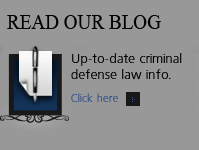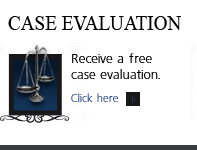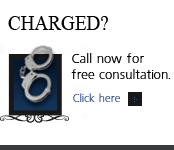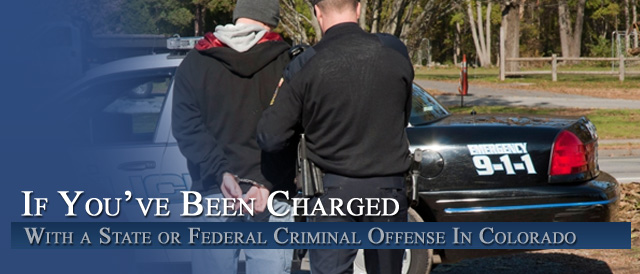

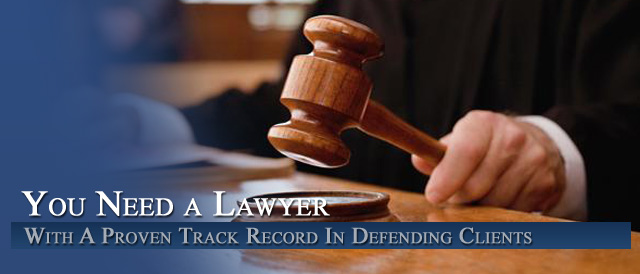
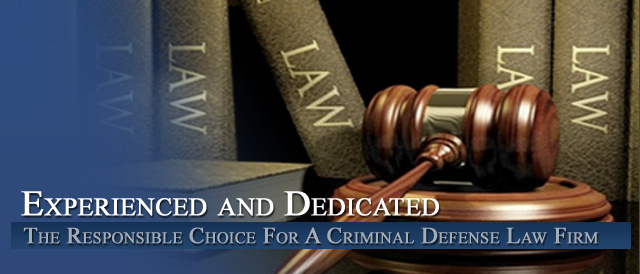
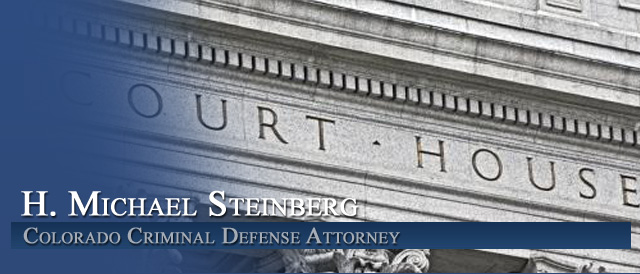
Colorado Criminal Law – How To Testify – How To BE A Witness*
By H. Michael Steinberg Colorado Criminal Defense Lawyer
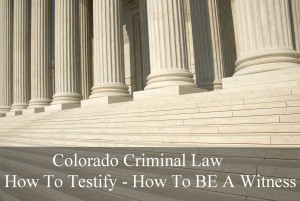 Colorado Criminal Law – How To Testify – How To BE A Witness* – The world of the courtroom is a strange and frightening place to most. Watching hundreds of Law and Order reruns won’t really prepare you for the experience. Unfortunately Colorado criminal trial lawyers also may not have the time to spend the kind of time necessary – beyond just going over a witnesses’s sworn testimony – to truly help client’s and witnesses to gain an “Inside Baseball” understanding of the task before them.
Colorado Criminal Law – How To Testify – How To BE A Witness* – The world of the courtroom is a strange and frightening place to most. Watching hundreds of Law and Order reruns won’t really prepare you for the experience. Unfortunately Colorado criminal trial lawyers also may not have the time to spend the kind of time necessary – beyond just going over a witnesses’s sworn testimony – to truly help client’s and witnesses to gain an “Inside Baseball” understanding of the task before them.
This article is intended to identify helpful tips and recommendations that may enhance the witnesses credibility and believability in a courtroom and especially at trial.
A Witnesses’ Fears – The Art Of Listening – “Lawyer To Witness” – “Witness To Lawyer”
Witnesses, whether they are the accused or a defense witness, need to be comfortable on the witness stand. A witnesses’ feelings can range from; anger at having to testify at all, to a deep and lingering frustration at just how long the process takes; from fears of being made to look foolish on the witness stand, to fears of forgetting key information, to the ultimate fear of the Defendant – the fear of a conviction.
Almost all trials resemble a play with many actors and many acts. No one actor – in this case – no one witness is solely responsible for the resulting story as trials are the combination of a thousand elements coming together over what usually is only a few days in time for most criminal trials.
There is nothing “natural” about taking the stand. In fact – it is one of the most unnatural experiences in life. As a witness – questions are fired at you usually by lawyers who are masters at obfuscation and confusion. The act of answering questions – even those posed by the side calling you as their witness – can be not just uncomfortable it can be intimidating.
In addition, the lawyers are speaking in a foreign language. They use rules – such as the rules of criminal procedure and the rules of evidence that are confusing and archaic at times. They have “bench conferences” and secret meetings “off the record” “outside of the presence of the jury” or “in chambers.” All of this creates an almost constant feeling of anxiety and yes, even fear.
Telling Your Story As A Witness Should Not Be Hard – But It Is…
While the credibility of a witness should not turn on their confidence of that witness on the witness stand. The reality is it does depend on how the witness testifies. Jurors and Judges look to the witnesses’ ability to communicate clearly, to be calm and to keep their emotions under control.
Their voice, their body movements, their eye contact, even the way the witness walks to the witness stand and is sworn in – everything … MATTERS. Was their voice clear – was their language concise – were their nonverbal cues appropriate for the moment? If the answers are yes, the witness is viewed as more credible, and yes, more persuasive.
If there is debilitating “witness anxiety” it WILL affect communication.
The Need For Proper Witness Preparation
Before every hearing, every trial, every sentencing, every court appearance, a witness needs thorough preparation. Clear instructions in the calm of the lawyer’s office should include understandable guidelines of not only what to say, but how to say it based on the lawyer’s reasonable expectations of the witness.
Part of that preparation means exploring the witnesses’ personal “agenda.” The witness should be asked the question – How do you feel about having to testify? What are your fears? … Your concerns?” Those questions and concerns should be addressed and should lead every prep session.
A Witnesses’ Anxiety Can Quickly Turn To Anger
People react to testifying in many ways – anger and aggressiveness are among the most common.
However emotional and belligerent responses will destroy a witnesses’ credibility on the stand. Anger reinforces the worst assumptions of the jury that the witness is lying. While a witness may think that an angry reaction to a “cheap shot” question is effective – actually the opposite is usually true
The excuse that a person is “not themselves” when they are fearful and anxious – is lost on the jury. The fact that a juror may have sympathy for the witnesses experience on the witness stand does not necessarily translate to the juror believes what the witness is saying.
Jurors believe that “truth is truth” …period. Jurors do not have the life experience in the courtroom to understand what anger has to do with telling the truth.
But for the anxious witness, their unresolved anger for the unprepared witness may be expressed on the stand as by such things as:
- the crossing arms or legs,
- cynical or sarcastic responses or
- speaking in a overly loud and intentionally intimidating voice
These testifying “issues” are often perceived by juries as defensive, evasive, even secretive. Jurors perceive anger as the mask we wear when we are dishonest…
For The Witness On The Witness Stand – Anger Is The Child Of Anxiety
A Colorado criminal lawyer’s job is to determine the source of a witness’s anxiety and then “treat it.” Clearly almost all witnesses’ have a form of anxiety. Almost all witnesses have a “tell” if you know where to look for it. “Diagnosing” and “treating” an anxious witness means finding the source of their anxiety and trying to eliminate it. This is done slowly over time with education and practice.
Some common fears of the witness and sources of anxiety are:
I will let down the Defendant and lose the case for them: This belief emerges when the witness thinks they are the lynchpin of the case. The cure is to let the witness know the case is much larger than their testimony and that while they are an important brick in the wall of the defense, they do not comprise the entire defense.
I am afraid I will make a mistake on the stand: All witnesses will make mistakes. The cure here is preparation – question and answer sessions with the lawyers simulating cross examination questions for the witness and also helping the witness understand the “traps” and “tricks” of cross examination (see below).
I am afraid of looking stupid or incompetent. I know I am going to embarrass myself and the jury or judge will blame me for failing: Once the lawyer has thoroughly prepared a witness and repeatedly run through the questions he will ask and the anticipated cross examination that will likely arise from the potential issues in the case, this feeling will also disappear. Unless the witness is prepped well – these beliefs will turn into self-fulfilling behavior on the witness stand.
I don’t want to reveal personal or private information on the witness stand: The fear of the “invasion of privacy” that arises from the helplessness of having to answer personal questions under oath – is very real. Here the lawyer must assure the witness that if that happens – and the information sought has nothing to do with the case – the lawyer will object to the question and ask the judge to not only prevent the answer to the question from having to be given but to instruct the lawyer to stop this line of questioning.
The Role Of The Defense’ “Theory Of The Case” – Understanding Themes
Every witness testifying for the defense must be made to understand how they fit into the whole. They must be able to answer the question – “How does their testimony fit the defense theory of the case?” That of course begs the question – what ARE the core themes of the Defendant’s case?
Once a witness understands how their testimony fits the core themes of the case – (also known as the Defendant’s theory of the case) – their natural anxiety is greatly lessened. Understanding the very basic psychology behind this idea is simple – when witnesses take ownership of their role in the play that is the defense case – it is much more likely they will succeed at their task.
There are typically 3 to 5 overriding themes in every case. When a witness understands those themes from the perspective of the State of Colorado as compared to the Defendant – they will be ready for the cross-examination questions that are coming. The witness will not be surprised by those questions and will appear to the jury as organized, prepared, firm in their testimony and knowledgeable. When the DA attempts to mislead or mis-characterize those themes by that lawyer’s unfair questions – the defense witness will be ready.
The Games Trial Lawyers Play -When You Are “Cross Examined”
Knowing what may be coming for a witness anticipating a tough “cross” means not only understanding the subject matter of the witnesses’ testimony, it means understanding the techniques trial lawyers commonly use.
Almost all of the techniques used are intended to compel the witness to “volunteer” information that should be withheld by the witness. So I start with this warning: the first and most basic warning to the defense witness – never – ever – ever – “volunteer” more information than is absolutely required by the question asked.
In addition to that very basic admonition….
Beware Of Opposing Lawyers Who:
Are Nice And Friendly – When the opposing counsel is trying hard to get you to like them – you should be on your highest alert. A disarmingly nice lawyer is not your friend. The witnesses fear that they will be “grilled” is quickly replaced by affection for the lawyer who is not adversarial or abrasive. While the witness should not him or herself become abrasive – they should never “drop their guard.”
Use Long Pauses After Questions Are Answered And Before The Next Question Is Asked.
It is natural to want to “fill” gaps of time between questions. Those carefully planned “pregnant pauses” are intended to make you feel uncomfortable. People always seek to fill awkward silences with “talk.” Don’t be fooled – just wait for the next question. Get comfortable with silence – it takes time to get there… so practice.
Act As If They Cannot Understand Your Answer – The Subject Matter – Or Are Too Unintelligent To Comprehend The Area Of Inquiry They Are Asking Questions About – The trial lawyers I know – before they begin a trial – research and carefully study every topic of inquiry relevant to the witness and his or her area of testimony. Don’t be fooled by the lawyer who intentionally plays “dumb” and asks the witness to “teach them” the ropes. If you hear a question such as “please help me understand this” – a red flag should go up that you are about to be led down a path fraught with peril.
Fakes Shock Or Absolute Disbelief That You Could Give That Answer – Any lawyer who has prepared his case should never be surprised by a witnesses’ answer. If the lawyer acts surprised – another red flag is being waived at you – and again don’t be fooled into volunteering more than the last question asked and stick to your answer. .
Ask The Same Question Over And Over – Repeating The Question By Asking The Same Question Differently Each Time – If your lawyer is experienced – he or she will catch the re-asking of the same question using different words. If your lawyer misses the new “version” of the question – and fails to object with “asked and answered judge” – do not react with sarcasm or frustration. If there is no objection from your lawyer – answer the question in precisely the same .. and consistent way…. and do NOT volunteer any additional information to keep your answer “fresh.”
When Witnesses “Over-Prep” – Never Memorize The Questions And The Answers
Testimony should be prepared – but not “over-prepped.” A witnesses’ testimony should never look “scripted” as in a well rehearsed “q and a” session. Jurors dislike, and will therefore discount, testimony that does not appear spontaneous. While they expect some preparation – they dislike obviously pat, scripted answers and the boring pace of a scripted exchange on direct examination.
Exactly Where A Witness Should LOOK While That Witness Is Testifying – Eye Contact Issues
Experts in this field recommend that a witnesses’ testimony be viewed as a form of a “two-way” dialogue. While the courtroom exchange of question and answer is between the lawyers and the witness – the intended audience is clearly the jury. Therefore witness – jury eye contact is essential and should be “worked into” the testimony.
Research in the area of “witness persuasion” supports the importance of eye contact. A witness who refuses to look at the jury is perceived by the jury as not telling the truth. This finding begs the question of exactly “when” should the witness look at the jury? This is a question of balance.
The experts in this area recommend the witness respond to “short answer” or “yes and no” questions – directly to the lawyer who is asking the questions. However, when answering longer and more important, sometimes called “narrative “ answer questions – the lawyer should instruct the witness (“please explain to the jury”) to direct the witnesses’ answer to the question to the jury panel.
While not “staring” at the jury – the witness should naturally answer the question to the panel as a whole – scanning the entire panel and not directing the answer to any one or two individuals on the panel of jurors- (which could make those one or two jurors uncomfortable).
Try To Avoid Non-Verbal Behaviors That Will Distract From The Impact Of Your Testimony
Jurors, like all of us, tend to be students of human nature. Juries are naturally astute with respect to non-verbal communication and while they may not know exactly why they dislike a witness – they will know they dislike him or her. For this reason control over non-verbal behavior by the witness while on the witness stand needs to be a part of the trial lawyer’s witness preparation.
Some Additional Concrete Suggestions On How To Try To Control Non-Verbal Behaviors While Testifying
- Don’t repeatedly shake your head no, make audible noises or use facial expressions of disdain. While you don’t want to appear stony – try to remain always professional in your responses
- Try to avoid non-verbal actions such as wringing your hands, rapid blinking, hedging your answers, covering your face or mouth, crossing your arms – as these are identified with behaviors perceived as indicating a lie or with evasiveness.
- Don’t unnaturally “buy time” to think about your answers by cleaning glasses, fidgeting with documents, or repeatedly taking a drink of water.
- While testifying, don’t look around the entire courtroom while speaking, groom your body such as scratching, playing with your hair or repeatedly rubbing your legs.
- Don’t rock back and forth in the witness chair, unnecessarily shifting position while testifying or push way back in the witness box.
- Speak up – don’t mumble – speak in a clear and natural tone.
- Try to avoid overt signals of nervousness – such as being overly smiley, strange laughing or “giddiness.”
Keeping Your Answers Naturally “Short”
All people including judges, juries, lawyers, and yes even witnesses, resent the abuse of the “captive audience.” We all suffer from “listening fatigue” over time. That means there is a limited window of persuasion during which any person will have the capacity to pay close attention and that window is always closing. For that reason the witness must keep his or her answers direct, short and to the point, focused and on-task.
Long winded or “verbose” answers not only irritate jurors, they are often filled with unnecessary information that could be later used to hurt that witnesses’ credibility.
Other Strong Suggestions When Testifying:
Do NOT Appear Evasive (as if you are hiding something). Try not to “look evasive.” If you do look evasive – you will lose credibility with the jury. Therefore try to directly answer the question and not “dance around”or appear to try to avoid the question being asked. Try not to show hesitation before answering ANY question, the opposing lawyer’s, your lawyer’s, or the Judge’s. Never change your answer based on who is asking the question.
Avoid All Forms Of Confusing (and sometimes patronizing sounding) “Technical Jargon” – You will often, in a Colorado criminal case, hear police officers use “cop talk” – or law enforcement jargon during their testimony. This jargon may impress their fellow police officers but if used excessively, it WILL alienate the jury. If you are defending the case – and the officer is testifying for your case, as sometimes happens, you want the officer to be understood and to eliminate “jargon speak.” This goes for all professional and expert witnesses as well.
Never Use “Weak And Powerless Language” – The concept of powerless speech is taken from basic linguistics. It is defined by speech that uses “hedge language” such as – kinda – “sorta” – and fillers such as well – “ah and um.” It is also further defined with “lead in language” preceding the witnesses’ answer such as – “I am not sure I should say this but” – or ‘this answer might be a bad idea but” …and the like.
The use of weak or powerless language is the curse of the facts – because the facts are lost in the delivery of the truth. The witness who uses these fillers or lead ins is perceived as “unsure” of their testimony and therefore less believable.
Avoid The Use Of “Tag Phrases” Other forms of led in language is the use of so called “tag phrases” such as “to be honest,” “to be frank with you, ” The obvious implication from the use of this language is the witness was not telling the truth or being frank at other times during their testimony. Equally important is avoid the use of other terms such as “I think,””I believe,””maybe”and “perhaps In addition” all suggesting a lack of strength and decisiveness in the delivery of the witnesses’ testimony.
Avoid The Message “Can’t You See, I Really Don’t Want To Be Here’” Sometimes a witness may appear unemotional, flat, and uninterested in the proceedings. This witnesses’ testimony – if offered by the defense – can be devastating to a Defendant as criminal cases – more than almost all other cases – ruin lives if there is a conviction. If a witness cannot be made to understand the importance of their testimony and to act accordingly – the trial lawyer should consider, if it is possible, striking that witness from the lawyer’s witness list.
Never Change Your Demeanor Just Because The Prosecutor Is Now Asking The Questions On Cross Examination. A witness should never change their demeanor on the witness stand just because the opposing lawyer is now asking the questions. A witness that is positive, clear and direct when his lawyer is asking the questions – should never become flippant, curt, or sarcastic during cross examination. The witness should seamlessly make the transition and should appear, at all times, to be telling the truth to both lawyers.
It Is OK To Say “I Don’t Know.” If the witness is unsure about an answer, either on direct or cross-examination, an “I don’t know is actually appreciated by the jury. If the lawyers believe they can refresh memory, or assist the witness in recalling an event, an “I don’t know” triggers the attempt. Such an answer is human and the witness should not be afraid to use the phrase when appropriate.
Summary – Colorado Criminal Law – How To Testify – How To BE A Witness*
A good witness is one who is prepared, and while afraid to testify, overcomes those fears and testifies with the qualities necessary to persuade the judge and or jury. I hope this article assists you, if you become a witness, to be the best witness you can be, during what is certainly well understood to be a difficult task. H. Michael
Colorado Criminal Law – How To Testify – How To BE A Witness*
* Attribution for many of the ideas, research and techniques suggested in this article is given to the truly excellent litigation experts at Litigation Insights http://www.litigationinsights.com/
If you found any information I have provided on this web page article helpful please click my Plus+1 or the Share button below so that others may also find it.
Never stop fighting – never stop believing in yourself and your right to due process of law.
ABOUT THE AUTHOR: H. Michael Steinberg – Email The Author at [email protected] – A Denver Colorado Criminal Defense Lawyer – or call his office at 303-627-7777 during business hours – or call his cell if you cannot wait and need his immediate assistance – 720-220-2277. Attorney H. Michael Steinberg is passionate about criminal defense. His extensive knowledge and experience of Colorado Criminal Law gives him the edge you need to properly handle your case.
 You must make a responsible choice for a Colorado Criminal Defense Lawyer – we encourage you to look at our firm. Over the last 40 plus years – H. Michael has mastered nearly every area of criminal law, procedure, trial and courtroom practice and he is passionate about getting you the best result in your case. He has written, and continues to write, extensively on Colorado criminal law and he hopes this article helps you in some small way – Theft Crimes Site – Colorado Criminal Law – How To Testify – How To BE A Witness*
You must make a responsible choice for a Colorado Criminal Defense Lawyer – we encourage you to look at our firm. Over the last 40 plus years – H. Michael has mastered nearly every area of criminal law, procedure, trial and courtroom practice and he is passionate about getting you the best result in your case. He has written, and continues to write, extensively on Colorado criminal law and he hopes this article helps you in some small way – Theft Crimes Site – Colorado Criminal Law – How To Testify – How To BE A Witness*

Other Articles of Interest:
- When Experts Testify
- Unfair Tactics
- Your Legal Rights in Court
- A Colorado Criminal Defense Lawyer On: How To Testify In A Criminal Trial
- The Hearsay Rule

